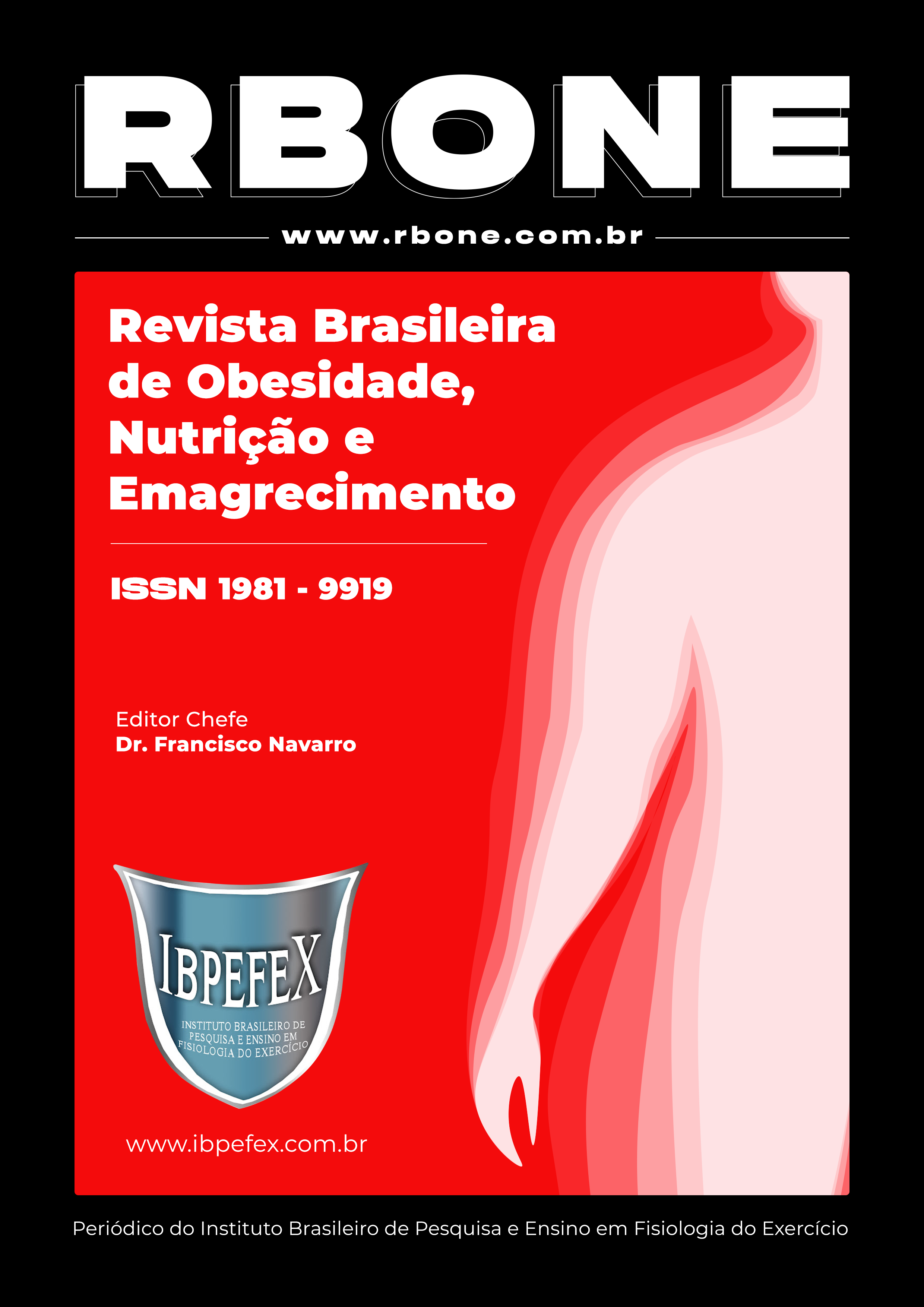Prevalence of risky eating behavior for orthorexia nervosa in nutrition academics
Abstract
Objective: This study aimed to identify a prevalence of orthorexia nervosa (ON) in Nutrition students. Methods: This is a quantitative and cross-sectional study. Nutrition students of both sexes aged 18 or over, from the State University of West Paraná, municipality of Francisco Beltrão-PR participated in the research. The Ortho-15 questionnaire was used to assess eating behavior characteristic of orthorexia. Results: It was observed that 27 (44.26%) individual showed risk behavior for developing ON, predominantly in females (96.29%). In relation to the grade attended, students in the first years had a higher risk of for developing ON. Considering the body mass index (BMI), eutrophic students had a higher risk of development and when relating orthorexia and physical activity, practitioners of physical activity two to three times a week showed a greater risk for the development of ON. Considering housing, family income and pathologies, the risk was predominant in urban area residents, income from one to six minimum wages and with pathologies. Conclusion: NO is an alteration in eating behavior not considered an eating disorder, in which there is an exaggerated concern with healthy eating. More studies and dissemination on the subject are needed, as it in a little known and discussed subject, with pathological potential and serious consequences, which cause problems that go beyond the psychosocial context, as well as nutritional problems. This can influence the lives of these students and their professional behavior in different ways.
References
-Cavero, V.; lodwig, C.; Lulli, G.; Tejada, R. La ortorexia: Un nuevo reto para los profesionales de la salud. Alan. Caracas. Vol. 65. Num. 2015. p. 199.
-Coelho, G. C.; Troglio, G. M.; Hammes, L.; Galvão, T. D.; Cyrino, L. A. R. As consequências físicas, psíquicas e sociais em indivíduos com ortorexia nervosa. Revista Brasileira de Obesidade, Nutrição e Emagrecimento. São Paulo. Vol. 10. Num. 57. 2016. p. 160-168.
-De Marchi, P.; Baratto, I. Prevalência de ortorexia nervosa em acadêmicos do curso de Nutrição em uma Instituição de Ensino Superior no sudoeste do Paraná. Revista Brasileira de Obesidade, Nutrição e Emagrecimento. São Paulo. Vol. 12. Num. 74. 2018. p. 699-706.
-Donini, L. M.; Marsili, D.; Graziani, M. P.; Imbriale, M.; Cannella, C. Orthorexia nervosa: validation of a diagnosis questionnaire. Eat Weight Disord. Vol. 10. Num. 2. 2005. p. 28-32.
-Luna, C.A.; Belmonte, T.S.A. Ortorexia nervosa: um desafio para o nutrólogo. International Journal of Nutrology. Vol. 9. Núm. 1. 2016. p.128-139.
-Mancuso, A. M. C.; Silva, M. E. W. Percepção e expectativas dos alunos ingressantes no curso de nutrição. Revista Cultura e Extensão Usp, São Paulo. Vol. 8. 2011. p. 79-95.
-Mussoi, T. D. Avaliação Nutricional na Prática Clínica: da gestação ao envelhecimento. Rio de Janeiro. Guanabara Koogan. 2014.
-Peixoto, M. R. G.; Benício, M. H. D'A.; Jardim, P. C. B. V. Validade do peso e da altura auto-referidos: o estudo de Goiânia. Revista de Saúde Pública. Vol. 40. Num. 6. 2006. p. 1065-1072.
-Penaforte, F. R. O.; Barroso, S. M.; Araújo, M. E.; Japur, C. C. Ortorexia nervosa em estudantes de nutrição: associações com o estado nutricional, satisfação corporal e período cursado. J. bras. psiquiatr. Vol. 67. Num. 1. 2018. p. 18-24.
-Plichta, M.; Jezewska-Zychowicz, M. Orthorexic Tendency and eating disorders symptoms in polish students: Examining Differences in Eating Behaviors. Nutrients. Vol. 12. Num. 1. 2020. p. 218.
-Pontes, J. B. Ortorexia em estudantes de nutrição: a hipercorreção incorporada ao habitus profissional? Dissertação de Mestrado em Ciências da Saúde. Universidade de Brasília. Brasília. 2012.
-Pontes, J. B.; Montagner, M. I.; Montagner, M. A. Ortorexia nervosa: adaptação cultural do Orto-15. Rev. Demetra: alimentação, nutrição & Saúde. Vol. 9. Num. 2. 2014. p. 533-548.
-Rocha, M. A. P.; Barthuchoto, M.; Lopes, J. E.; Costa, K. Ortorexia: uma compulsão por alimentos saudáveis. Nutr Bras. Vol. 14. Num. 1. 2015.
-Silva, M. R. D.; Fernandes, P. L. Presença de ortorexia nervosa em estudante de Educação Física e Nutrição. Colloquium Vitae. Vol. 12. Num. 1. 2020. p. 45-51.
-Souza, Q. J. O. V. D.; Rodrigues, A. M. Comportamento de risco para ortorexia nervosa em estudantes de nutrição. J. bras. psiquiatr. Vol. 63. Num. 3. 2014. p. 200-204.
-Thomaz, P. M. D.; Silva, E. F.; Costa, T. H. M. Validade de peso, altura e índice de massa corporal autorreferidos na população adulta de Brasília. Revista Brasileira de Epidemiologia. Vol. 16. Num. 1. 2013. p. 157-169.
-Vital, A. N. S.; Silva, A. B. A.; Silva, E. I. G.; Messias, C. M. B. O. Risco para desenvolvimento de ortorexia nervosa e o comportamento alimentar de estudantes universitários. Saúde e Pesquisa. Vol. 10. Num. 1. 2017. p. 83-89.
Copyright (c) 2022 Natalia Bergonzi, Marina Daros Massarollo

This work is licensed under a Creative Commons Attribution-NonCommercial 4.0 International License.
Authors who publish in this journal agree to the following terms:
- Authors retain the copyright and grant the journal the right of first publication, with work simultaneously licensed under the Creative Commons Attribution License BY-NC which allows the sharing of the work with acknowledgment of the authorship of the work and initial publication in this journal.
- Authors are authorized to enter into additional contracts separately for non-exclusive distribution of the version of the work published in this journal (eg, publishing in institutional repository or book chapter), with acknowledgment of authorship and initial publication in this journal.
- Authors are allowed and encouraged to post and distribute their work online (eg, in institutional repositories or on their personal page) at any point before or during the editorial process, as this can bring about productive change as well as increase impact and impact. citation of published work (See The Effect of Free Access).






